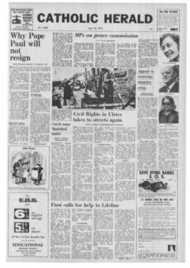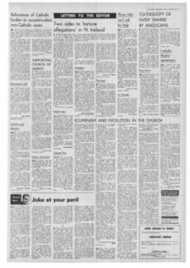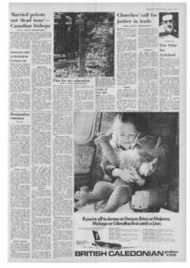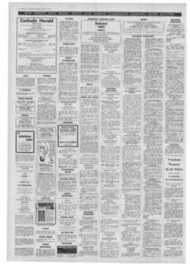Page 9, 28th April 1972
Page 9
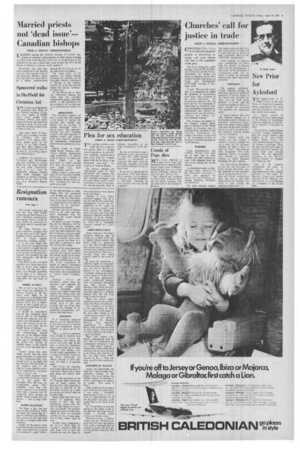
Report an error
Noticed an error on this page?If you've noticed an error in this article please click here to report it.
Tags
Share
Related articles
'fantasy' Talk On Pope Resigning
Head Of Jesuits Resigns But Pope Tells Him To Eta
Will Pope Paul Retire At 75? People Are Busy These
Pope Meets Fr Arrupe For Talks On Resignation
Abdication Talk Scotched In Rome
Resignation rumours
from page 1 This article emphasised the fact that Pope Paul should resign because the Church is in such turbulence, contradiction and turmoil that he would be well advised in conscience to step aside and let someone else handle it.
The Pope, however, has never failed to recognise that he has been faced with titanic problems within the Church as well as almost equally formidable problems outside.
It is far more likely that Pope Paul also recognises that if the Church is in such turmoil and confusion he did not cause it. it was done in the main by a Council that included the one who, presumably, will fill his shoes one day.
Pope Paul, so far as I could ascertain from those who have been in almost daily contact with him over the past years,
looks upon himself somewhat in the light of a "clean-up" man, rather than as one who is responsible for any kind of "mess."
THREE SYNODS This is not to say that the Pope denies the usefulness of Vatican Council II. He has never been blind to its usefulness nor is he blind to the potential usefulness of that collegiality which was so underscored by the Council and so defended by Pope Paul himself in the Council.
It should be remembered that he has convened three synods; that in the building erected for audiences and obviously not constructed to last only a few months, he has included an entire floor for the Worm Synod of Bishops.
It is quite clear that, while not compromising himself one iota on the unique claims of his Primacy, he remains fully open to collegiality once the Synod has proved its viability which, in the opinion of some, it has not done up to now.
Another factor that must weigh heavily with the Pope against thoughts of resignation is that, temperamentally consituted as he is, he might well fear that his initiatives both on the political and on the religious fronts could be reversed or neglected by a successor within a year or two.
Pope Paul's physical health is remarkably good for a man of his age; some who remember Pius XII even say exceptionally good. They remember how Pius was always reported to be suffering from ulcers, anaemia and innumerable other diseases yet would almost gallop into audiences — just as Pope Paul does.
RAPID RECOVERY The Pope is thin and has been so since childhood. There are those who regard this as a sign of weakness and debilitation; others call him spry and see this as strength rather than weakness.
Except for the period when he had his prostate operation in 1967, from which he recovered in fantastically rapid fashion, he has suffered from no other disease than the occasional cold. During last year's Synod he had a cold for three days. Two of the days he continued to attend sessions; the third he remained in an even-ternperatured room nearby.
Charges that he is slowing down in his work and that some documents wait his signature for months should not be linked.
He shows no signs of tapering off his initiatives. On the contrary he multiplies them virtually every month. Had he given any such indication then the resignation argument might have a certaindrearnlike validity but, as matters stand, none of his actions are those of a roan who is planning to write his will let alone resign.
Some of his most important initiatives have been taken since the 1971 Synod, including the reform of the synod structures upon which he is working; the establishment of the Cor Thrum programme in which he places tremendous hope; the establishment of new secretariats or commissions to break down the responsibilities of certain Curial Congregations.
Certainly there are documents which await his signature and approval for weeks and months. One notable document, which created more furore within and without the Church than any other in recent memory was the encyclical Hunianae Vitae. That particular document took 'several years in the composition and saw Pope Paul over-,rule the findings of innumerable commissions, committees and individuals.
SPECIOUS It is sometimes suggested that he may be slowing down in his work because of reports that such documents, papers, projects are piling up on his desk.
This is a specious argument since, thanks to modern mass communicat ion s, correspondence and reports pile up on everyone's desk. If this were a reason for resignation ' then I personally know many cardinals and bishops who should resign immediately. As a matter of record, visitors to the Papal work-study are always amazed to note how clean his desk is of pending Paper.
And, finally, the argument that he has selected his place of retirement. About half a dozen such places are usually mentioned.
One is the monastery of the Tre Fontane (three fountains) near St. Paul's outside the Roman walls. The argument is that this is indicated in the Pontifical Annuary as a place he reserved to himself when he became Pope.
Surely Pope Paul had no intention of resigning when elected in 1963. One may legitimately assume that this was not the reason for reserving it to himself. The probable reason was that it was the place where St. Paul was beheaded and that he has a strong dessotion to Paul, whose name he took.
Another place mentioned is the cave to which Pope St: Celestin V. retired in 1294, the only Pope ever to have abdicated and one whis knew he never should have been elected in the first place.
Nothing in Pope Paul's character suggests that he is afraid to do his duty and he has courageously braved the unpopularity of the world on many occasions, notably over birth control. His stands on social positions also have been extremely offensive to the rich Catholics of Latin America, the United States and even Italy, where he is sometimes regarded virtually as a Communist GREGARIOUS MAN Again, nothing in the Pope's character indicates that he would seek solitude of the sort to which Celestin retired. The present Pope is a gregarious man who likes people around him, enjoys lively conversation and has never wished to be cut off from the world. He is also a northern Pope who would scarcely retire to the south of Italy.
He made his pilgrimage to Celestin's tomb not long after he became Pope and much too soon for this to become indicative of any contemplated resignation. Perhaps he wished to pay tribute to a fellow-Pope who had been apprehensive (under considerable pressure from an extremely formidable man who became Pope Boniface VIII) about the position just as he himself was but who had opted for a different solution than the one Pope Paul is likely to choose.
There are many cogent arguments against the possibility that the Pope will abdicate.
One of these is to be found in the personalities of those who say that he will resign. In the main they belong to the "contraception camp" led, to some extent, by German
Redemptorist Fr. Bernard Haering and Canadian Augustinian Fr. Gregory Baum, both of whom have lost all their former Vatican posts and who claim that the Pope is a poor theologian.
These men appear completely disenchanted with the man who as a cardinal in the Council they viewed as a "man on a white horse" leading a crusade for a kind of liberalism which he did not have in mind at all. Hence, they feel that he has "let them down badly" because he has, in their opinion, veered to the reactionary right.
CONCEPT OF PAPACY Again, and importantly, the Pope has a passionately clear, luminous concept of the Papacy. He stood before the World Council of Churches in Geneva and began his address by saying : "Our name is Peter."
Some Catholics found great fault with this and argued that it was surely a dreadfully unecumenical thing to say in front of representatives of all the Protestant churches in the world. Not so the head of the W.C.C.
Dr. Carson Blake praised the statement. He added words to the effect that the Pope was obviously a Catholic priest without an identity crisis.
Referring to this, a Vatican prelate told me, "He knows exactly who he is and one gathers from such a statement that he intends to remain who he is until God decides otherwise. Not himself."
blog comments powered by Disqus


